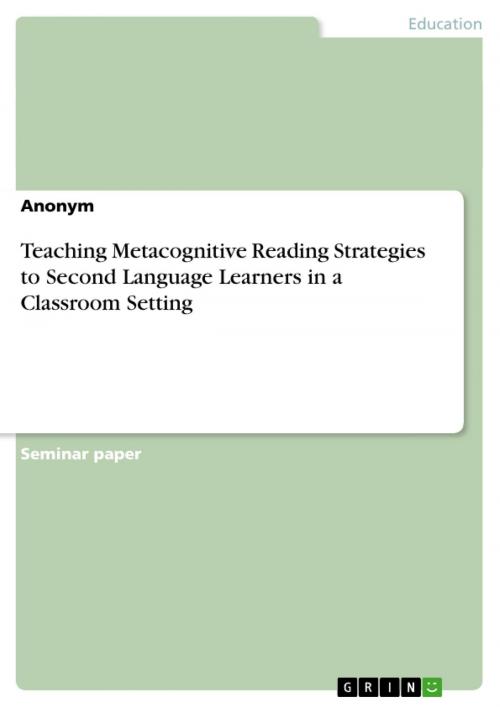Teaching Metacognitive Reading Strategies to Second Language Learners in a Classroom Setting
Nonfiction, Reference & Language, Study Aids, ESL, Foreign Languages| Author: | Anonymous | ISBN: | 9783640625925 |
| Publisher: | GRIN Verlag | Publication: | May 19, 2010 |
| Imprint: | GRIN Verlag | Language: | English |
| Author: | Anonymous |
| ISBN: | 9783640625925 |
| Publisher: | GRIN Verlag |
| Publication: | May 19, 2010 |
| Imprint: | GRIN Verlag |
| Language: | English |
Seminar paper from the year 2009 in the subject English - Pedagogy, Didactics, Literature Studies, grade: 2, University of Münster, language: English, abstract: Reading is an important skill which does not only provide the ability to gain new information but also acquires new language skills. Grabe identifies effective approaches for reading and determines that good readers need 'rapid and automatic word recognition skills', 'a large recognition of vocabulary', 'sound knowledge of syntactic structure and discourse organization', and 'metacognitive awareness of reading purposes and text comprehension' . Successful readers are those who use learning strategies effectively. Academic reading requires the development of strategic reading. Readers have to be aware of their goals in reading and be able to administer strategies effectively. These strategies are to be chosen carefully, depending on their purpose in reading. Only then will the reader be able to check his/ her understanding of the text and solve comprehension problems successfully. Out of the various aspects of teaching reading to second language (L2) learners in a classroom setting, the present essay will focus on metacognitive reading strategies. First, the question will be answered what is meant by the term 'metacognitive reading strategies'. A definition will be presented. Then, the essay provides a theoretic framework of metacognitive reading strategies before reading, while reading and after reading. Finally, there will be two examples of how metacognitive reading strategies can be taught in a classroom setting.
Seminar paper from the year 2009 in the subject English - Pedagogy, Didactics, Literature Studies, grade: 2, University of Münster, language: English, abstract: Reading is an important skill which does not only provide the ability to gain new information but also acquires new language skills. Grabe identifies effective approaches for reading and determines that good readers need 'rapid and automatic word recognition skills', 'a large recognition of vocabulary', 'sound knowledge of syntactic structure and discourse organization', and 'metacognitive awareness of reading purposes and text comprehension' . Successful readers are those who use learning strategies effectively. Academic reading requires the development of strategic reading. Readers have to be aware of their goals in reading and be able to administer strategies effectively. These strategies are to be chosen carefully, depending on their purpose in reading. Only then will the reader be able to check his/ her understanding of the text and solve comprehension problems successfully. Out of the various aspects of teaching reading to second language (L2) learners in a classroom setting, the present essay will focus on metacognitive reading strategies. First, the question will be answered what is meant by the term 'metacognitive reading strategies'. A definition will be presented. Then, the essay provides a theoretic framework of metacognitive reading strategies before reading, while reading and after reading. Finally, there will be two examples of how metacognitive reading strategies can be taught in a classroom setting.















